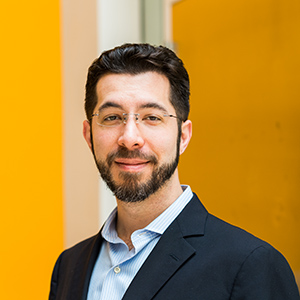
Inventing and Applying Tools for the Integrative Investigation of Brain Circuits
Description
How do brain cells work together as a circuit in order to mediate behavior, and how do these cells and circuits go wrong in disease states? The dense and heterogeneous nature of brain molecular composition and wiring, and the high speed and diverse nature of brain signals, make answering such questions challenging. Our group has been working on inventing technologies for the molecular and anatomical mapping of brain circuits, the precision control of their electrical activities, and the recording of their high-speed signal dynamics. I will talk about three toolsets that we are developing -- expansion microscopy, which physically magnifies brain specimens to enable their nanoprecise molecular mapping; optogenetics, which enables the targeted control of brain electrical activity; and new genetically encoded tools for dynamic imaging of brain signals that we are designing and evolving. I will also talk about how we are applying, often in interdisciplinary collaborations, such technologies towards the integrative investigation of how brain circuits generate behavior, and how to repair brain circuit dysfunction. Finally, I will also discuss how we are adapting our work to create projects that help fields beyond neuroscience, ranging from the analysis of tumor microenvironments, to new ways to manufacture nanotechnology.
Speaker Bio
Ed Boyden is Y. Eva Tan Professor in Neurotechnology at MIT, professor of Biological Engineering and Brain and Cognitive Sciences at MIT's Media Lab and McGovern Institute for Brain Research, and was recently selected to be an Investigator of the Howard Hughes Medical Institute (2018). He leads the Synthetic Neurobiology Group, which develops tools for analyzing and repairing complex biological systems such as the brain, and applies them systematically to reveal ground truth principles of biological function as well as to repair these systems. These technologies include expansion microscopy, which enables complex biological systems to be imaged with nanoscale precision; optogenetic tools, which enable the activation and silencing of neural activity with light; robotic methods for directed evolution that are yielding new synthetic biology reagents for dynamic imaging of physiological signals, such as neural voltage; novel methods of noninvasive focal brain stimulation; and new methods of nanofabrication using shrinking of patterned materials to create nanostructures with ordinary lab equipment. He co-directs the MIT Center for Neurobiological Engineering, which aims to develop new tools to accelerate neuroscience progress.
Amongst other recognitions, he has received the Croonian Medal (2019), the Lennart Nilsson Award (2019), the Warren Alpert Foundation Prize (2019), the Rumford Prize (2019), the Canada Gairdner International Award (2018), the Breakthrough Prize in Life Sciences (2016), the BBVA Foundation Frontiers of Knowledge Award (2015), the Carnegie Prize in Mind and Brain Sciences (2015), the Jacob Heskel Gabbay Award (2013), the Grete Lundbeck Brain Prize (2013), the NIH Director's Pioneer Award (2013), the NIH Director's Transformative Research Award (three times, 2012, 2013, and 2017), and the Perl/UNC Neuroscience Prize (2011). He was also named to the World Economic Forum Young Scientist list (2013) and the Technology Review World’s "Top 35 Innovators under Age 35" list (2006), and is an elected member of the National Academy of Sciences (2019), the American Academy of Arts and Sciences (2017), the National Academy of Inventors (2017), and the American Institute for Medical and Biological Engineering (2018). His group has hosted hundreds of visitors to learn how to use new biotechnologies, and he also regularly teaches at summer courses and workshops in neuroscience, and delivers lectures to the broader public (e.g., TED (2011), TED Summit (2016), World Economic Forum (2012, 2013, 2016)).
Ed received his Ph.D. in neurosciences from Stanford University as a Hertz Fellow, working in the labs of Jennifer Raymond and Richard Tsien, where he discovered that the molecular mechanisms used to store a memory are determined by the content to be learned. In parallel to his PhD, as an independent side project, he co-invented optogenetic control of neurons, which is now used throughout neuroscience. Previously, he studied chemistry at the Texas Academy of Math and Science at the University of North Texas, starting college at age 14, where he worked in Paul Braterman's group on origins of life chemistry. He went on to earn three degrees in electrical engineering and computer science, and physics, from MIT, graduating at age 19, while working on quantum computing in Neil Gershenfeld's group. He has contributed to over 160 peer-reviewed papers and 190 granted patents, and given over 500 invited talks on his group's work. He has co-founded four startup companies. Long-term, he hopes that understanding how the brain generates the mind will help provide a deeper understanding of the human condition, and perhaps help humanity achieve a more enlightened state. His full CV is posted here.
Additional Info
This webinar has been updated to allow participation by those witout an MIT login.
Before the talk, BCS Department Head Jim DiCarlo will announce recipients of the department's annual faculty and graduate student awards in teaching and mentorship.

